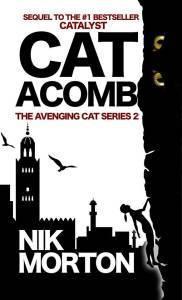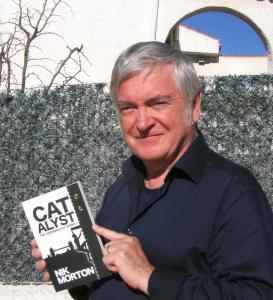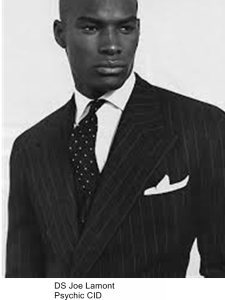Shani Struthers's Blog, page 5
November 19, 2015
Something for the Weekend with Nik Morton
It’s been a busy week on the blog but my final guest this week is Nik Morton, author of many fine books including The Avenging Cat series. Here he talks about what inspired it and shares a generous excerpt. Happy reading folks!
Genesis of the Cat
When I conceived the ‘Avenging Cat’ series, I wanted it to be fast-paced, travelling to many foreign places, laced with humour, injected with suspense, and containing some interesting larger-than-life characters, both good and bad. And as the majority of readers are female, I thought the main character should be a resourceful but flawed young woman. All within about 50,000 words per self-contained adventure.
Catherine Vibrissae emerged fully formed, a trained chemist who turns to modelling on the catwalk to earn enough money to pursue her vendetta against Loup Malefice, the founder and owner of Cerberus, a global corporation.
Why does she hate Malefice? Because that man was responsible for taking over her father’s company, shortly before her father was in a fatal car crash; she was left almost penniless. Born on 12 August, 1985, Cat studied chemistry at Oxford 2006-2010, graduating roughly a year after her father was killed. I felt it was essential to create a back story about her parents, even though they’re both dead by the time the first book, Catalyst, starts.
Cat has studied taekwondo, is an accomplished free climber and parachutist, and had used her father’s hand-gun on a firing range. As a model she travelled widely to various fashion shoots and shows – Italy, China, France and Morocco, where she often established contacts that would prove useful later.
It is not advisable to only have a single main protagonist: there is little dialogue and an over-reliance on thought processes. Early on, then, she meets Rick Barnes, who also has a good reason to dislike Malefice, and, after some initial tantalising verbal jousting, they join forces, and he becomes her sounding-board. Rick little realised what he was getting into. While he is fit, his lifestyle is staid, that of a company lawyer, when compared to Cat’s: a perfect foil for her.
Excerpt from Catacomb, (second in the series and just published):
Cat tugged on a pair of latex gloves and then padded across the thick pile carpet, the sensation quite pleasurable for her bare slightly damp feet. She lowered to one knee and swung open a cupboard door. Inside she recognised the type of safe, with its distinctive handle and combination wheel. “Found it,” she said into her phone.
“Glad it’s still there!”
“Me, too. I’ll be in touch.” She closed the call. Now, for the first time, she would test her safe-cracking skill in earnest. Compared to her other pursuits, this had taken what seemed like an inordinate time to master. At least Chuck was a patient instructor, and his training had been intensive.
***
Her previous encounters with Cerberus had convinced her that if she was serious about continuing her vendetta, she needed to learn safe-cracking. Five months ago, Rick had said rather sheepishly, “I might know the man who can help you.” Chuck Marston was one of the useful contacts in Rick’s little green book. “My father says Chuck has proven useful from time to time. He’s an American, a retired jewel thief.”
“Can we afford to pay him?” she’d asked.
“He’s retired – on his ill-gotten gains, I imagine. He doesn’t need money.”
“Will he help me?”
“Let’s try him and see.”
“Sure, your proposition sounds intriguing, son,” Chuck replied over the phone. “Let’s do dinner. You pay.” He named a medium priced restaurant off the beaten track, and they met outside.
Chuck was five-foot nothing, thin and wiry with a pot belly. He was in his early sixties, she reckoned, and he was balding, with tufts of unruly grey hair over his ears. White hair sprouted from his ears and nostrils. He had long drawn features, with drooping eyebrows and a lined forehead. His hazel eyes flashed mischievously as he spoke; she liked him immediately.
As she shook his hand she felt his skin was dry, leathery. “Never mind these hands, honey,” he said, speaking round an unlit cigar. “They’ve got like that due to fondling over a thousand metal mistresses.” The pads at his fingertips seemed unusually smooth. “I managed to unlock the mystery of every one of them.” He winked. “If you pay attention, you can do the same.”
“Then I will pay attention, Mr Marston,” she responded.
He chuckled. “Good. I like your no-nonsense attitude, Cathy. We’ll get along fine. Oh, and call me Chuck. That’s the drill.”
“Was that a joke, Chuck?”
“No, honey, I don’t joke about my name. I have a reputation, you know. Fortunately, it’s all based on scores that have passed the statute of limitations.” He winked again.
He shoved the cigar in his top pocket, led the way into the restaurant. The maître d’ clearly knew him and showed all three of them to a secluded table. A bottle of champagne was chilling in its bucket on a stand.
The sommelier charged their flutes and then they were left alone to decide on their order.
Chuck opened the menu, leaned back in his chair. “The deal’s off, by the way.”
Cat eyed him. “We haven’t arrived at a deal yet.”
He grinned at both of them. “I like the pair of you. The meal’s on me.”
“That’s generous of you,” Rick said, “but—”
“No, Rick,” Cat interrupted, “let Chuck pay. If we’re going to learn from him, we need to do as he says.”
Chuck chortled. “Hot damn, you’re on the ball, Cathy. That’s precisely it!”
“As I said, Chuck, I pay attention.” She opened her menu.
***
After she opened the safe, she whistled softly. On the shelf were several thick bundles of pristine fifty-euro notes amounting to €500,000. At the back, behind the money, was a black velvet bag. She opened it, poured into her palm a diamond necklace and an exquisite gold filigree brooch with a diamond at its centre. It was tempting to take some of this loot, if not all, but she didn’t want anyone to know that the safe’s contents had been compromised. On the floor of the safe were five folders. Fortunately, Petra Grimalkin was Malefice’s bag-lady as well as one of his heads of division, so carried important documents when accompanying her boss; that fact had prompted this latest break-in. Cat grabbed all of the folders and stood at the bar, checking the titles.
Tangier
Marrakesh
Rome
Durban
Izmir
Rick had mentioned Tangier; she wondered if he’d heard of Cerberus operations in these other places. She shrugged; no matter. A quick flick through them revealed that every folder contained a half-dozen sheets; they might prove useful in her ongoing war of attrition against Loup Malefice and his organisation.
Cat diligently photographed each document from the folders, then replaced them as she’d found them. She shut the safe door, twirled the combination wheel. Petra Grimalkin wouldn’t be aware that anyone had tampered with the contents of her safe.
“I’ve got the full details,” she informed Rick.
“Good. Now, please get out.” She loved him for that, the measure of concern in his tone. Not strident, but firm.
She returned to her shoes on the polythene sheet. They were still wet, understandably, and a small puddle surrounded them. She dabbed the towel in the puddle, absorbing most of the rainwater, glanced around and spotted the ice bucket and bundled the towel in there, then carried it to the bathroom. She’d squeeze the surplus water into the bidet..
She passed the two suitcases at the bedroom doorway, glanced in.
The bedding was in disarray. She stopped, puzzled. Perfume bottles lay scattered over the top of the dressing table, a few of them broken. The smell was pungent, even from here.
Maybe Petra and Zabala had argued.
She stepped into the bathroom and instantly dropped the ice bucket. Luckily, it missed her toes by inches; it emitted a ringing sound as it rolled over the tiles.
Cat gagged, felt the bile rising, kicked aside the wet towel and the ice bucket and rushed to the bidet on her right. She was just in time. Her lunch erupted, her stomach suddenly cramping. She ran the tap, careful not to send the water-stream full force, and washed away her weakness. She clutched the porcelain rim; her heart pounded against her chest as she leaned over. Gradually, she sensed her pulse slow and turned off the water. The strong perfume smell throughout the apartment couldn’t alleviate the powerful stench of vomit in her nostrils.
Snagging a toilet roll from the rack next to the bidet, she tore off sections and wiped her mouth and nose and then discarded it in the WC bowl, and flushed it away.
She got to her feet, stood on wobbly legs.
Trembling, she stared, her heart fluttering. She’d never seen anything like this. Ever. She fumbled at the phone. Selected Rick, punched dial.
“Are you out yet?” Rick asked.
She shook her head, tears blurring her vision. “Did you see them both leave?” she demanded, her throat raw, dry, her voice croaking.
“What, Zabala and Petra?”
“Yes, dammit!”
“What’s the matter, Cathy?”
“Well, did you?”
“No, I’m going on what I overheard in the lobby… Why, what’s wrong?”
“Petra never went to the art show.” Cat stared at Petra Grimalkin, her naked body eviscerated, lying in the open shower cubicle. A small trickle of blood dribbled off her soaked corpse and snaked towards the plughole. “She’s dead – murdered.”
Catacomb, published by Crooked Cat.
Website – www.freewebs.com/nikmorton
Twitter – @nik_morton
Blog – http://nik-writealot.blogspot.com
http://auguries-magazine.blogspot.com
Facebook – nik.morton.10@facebook.com
Goodreads – http://www.goodreads.com/Nikmorton
Amazon author – amazon.com/author/nikmorton
Pinterest – http://www.pinterest.com/nikmorton10


November 18, 2015
Delve into the World of Incarnate Justice!
 Today I’m interviewing author Juliet B Madison about her new book, Incarnate Justice, which is due to be released on Monday 23rd November 2015 and is currently available to pre-order. Juliet is the author of the traditional police procedural series, The DI Frank Lyle Mysteries, but the Psychic CID series is something rather different.
Today I’m interviewing author Juliet B Madison about her new book, Incarnate Justice, which is due to be released on Monday 23rd November 2015 and is currently available to pre-order. Juliet is the author of the traditional police procedural series, The DI Frank Lyle Mysteries, but the Psychic CID series is something rather different.
SHANI: Welcome to my blog, Juliet. I know you enjoy my Psychic Surveys series so thanks for your interest in that. Perhaps you’d begin by telling us a bit about yourself.
JULIET: I was born in Reading, United Kingdom, in 1975. I am single and don’t have any children by choice, although I have several author friends who are parents so they can help me if I get stuck with parent-child scenes in my books or anything to do with pregnancy. I also have Type 1 Diabetes and this often finds its way into my books as thirty-six years of living with the condition definitely qualifies me to write about it. I am a huge fan of traditional crime books, as well as Psychological thrillers, and I love the Sherlock Holmes stories. I have done a variety of extremely dull jobs and am currently trying to find a way out of my rubbish paid mind-numbing office cleaning job.
SHANI: I know your DI Lyle Series is set in the past, when there was more scope for forensic error. Did you choose to set the Psychic CID series in the future to be different?
JULIET: None of us know what life will be like twenty-five years from now. Incarnate Justice is set in 2040. At the present time police tend to dismiss help from psychics and people generally tar genuine ones with the same brush as fakes. I’m trying to challenge that perception. I want to create an alternate future where psychics and their special abilities will be respected. It’s more interesting to write stuff set in the future as people can’t openly rubbish you because they have no idea what may be forensically possible by then. I’ve done a lot of research into forensics for my previous books, but the Psychic CID series is more based on the use of psychic powers to solve crime than traditional police procedure.
SHANI: What psychic powers do your characters possess?
JULIET: The five Psychic CID officers are all mediums and they have other psychic abilities such as automatic writing and Psychometry (ability to pick up spirit messages through inanimate objects). One of them is an Empath. Saying more would give too much away.
SHANI: Do you have any psychic abilities?
JULIET: I’m a sensitive, which means I can sense spirits although I can’t see them. I also get spirit messages in the form of thoughts. Sadly I’m not able to get to the Open circle at my local spiritualist church nearly often enough; one of the banes of working evenings.
SHANI: What is Incarnate Justice actually about? What’s the story?
JULIET: Here’s the blurb
In 2015 thirteen-year-old Ellen Shaw disappeared without a trace. No traces of her alive or dead were ever found and the police dismissed a Psychic’s help.
In 2040 the recently formed Psychic CID are called in to investigate when decomposed human remains are found. The original Missing Person case files yield no clues
Newly promoted DS Joe Lamont has been plagued by disturbing dreams since his early teens and he feels a connection to Ellen that he can’t explain.
Will Lamont’s intuition prove to be a hindrance or a help and can Psychic CID solve the case and get to the truth about what really happened to Ellen?
SHANI: Do you have any characters that are totally closed off to the paranormal?
JULIET: Yes I do. Dr Monica Kaufman, the forensic pathologist, is totally closed off to the psychic world. She doesn’t get on with DI Lynch because of this. Kaufman believes that medicine and science can explain everything, but of course they can’t. Also DCI John Silva’s 19 year old daughter, Hayley, is closed off, but we will meet her in a future Psychic CID book.
SHANI: How do you think the book will be received?
JULIET: I’ve no idea as yet, Shani. I like to think it’s a bit different to both normal police procedurals and paranormal books. The market is over-saturated with paranormal books featuring witches, shifters, vampires and zombies so I decided to do cops with psychic powers for a change and there’s not a vampire or werewolf in sight.
SHANI: Can you give us a short excerpt from Incarnate Justice?
JULIET: I’ve found a different excerpt from the one I’ve used up until now. It can be hard deciding which ones to use without giving stuff away.
This is from the prologue which takes place in 2015.
It was already getting dark; the golden hues of a spectacular sunset had deepened to twilight and the rain hammered down.
Moira Hart sat in the window of Caffe Nero staring out into the dark street. The crowds had thinned since the rain had started. She sipped her latte and nibbled on the piece of chocolate caramel shortbread on the plate beside her. The feelings of unease that had plagued her for most of the day were relentless.
She felt the hairs on the back of her neck bristle and a shiver ran through her. It was not cold in the coffee shop, the chill was otherworldly. She saw a young girl, not more than thirteen or fourteen, walking past. The girl turned and stared into the window and for a moment her green eyes met Moira’s hazel ones. Then she was gone into the darkness.
SHANI: Where can people get their own copy of Incarnate Justice and where can we find Psychic CID online?
JULIET: You can pre-order your own copy of Incarnate Justice on Kindle, Kobo, itunes, and Nook
 You can Like the Official Psychic CID Facebook page
You can Like the Official Psychic CID Facebook page
You can Follow Psychic CID on Twitter
You can visit the Official Psychic CID website


November 15, 2015
Five Guns Blazing with Emma Rose Millar
It’s a busy week on the blog this week – as well as Friday’s guest, we’ve got two extra joining us. In the hot seat today is Emma Rose Millar, co-author of Five Guns Blazing. Here she not only shares an extract and the blurb (there are buy links too at the end of the post) but also what inspired her to write it. First up, that extract…
 We were separated, my mother and I in a most barbaric act; I was dragged screaming from her skirts, seized with a fit of panic, a horrible notion that I might never see her again, but my mother herself seemed to be trying almost to prise me from her.
We were separated, my mother and I in a most barbaric act; I was dragged screaming from her skirts, seized with a fit of panic, a horrible notion that I might never see her again, but my mother herself seemed to be trying almost to prise me from her.
“Pay no attention to him, Mrs Beedham,” said the matron brusquely. She set her lips and her jaw settled squarely. “We find most of the children react like this in the first place, but they soon get used to it. In fact, the crying stops mostly the minute they leave the room. There is a lot of camaraderie among the young boys, not always to be encouraged, I might add,” she continued, cutting a brief look at one of the gentlemen at the table, “but it prevents them from missing their parents too much we usually find.” She was a sturdy woman, whiskery and stern-faced with thick brown hair and a complexion as blotchy as white pudding. “Come along now, young sir. My goodness, what a fuss! There is no room for hysteria here; I could always take a strap to you if you wish.” Emma Rose Millar and Kevin Allen, Five Guns Blazing.
My grandfather was orphaned at the age of three and was sent with his two older brothers to one of the poor law schools in London. I grew up hearing stories about what conditions were like for the children there: tales of hunger and insufficient food, of my grandfather being forced to stand with his arms outstretched, holding two heavy boots. If he lowered his arms, he was beaten with a stick – this was the punishment handed down after he attempted to run away. Such institutions have always held a certain morbid fascination for me. My research into eighteenth-century workhouses for my novel Five Guns Blazing, was often harrowing, but in some way, it brought me closer to my beloved grandfather who sadly is no longer with us.
Children could be sent to the workhouse for a variety of reasons. Many were illegitimate, orphans, deserted children or children of felons. Once inside, children over seven years of age were usually separated from their mothers; parents were allowed daily interviews with their children. This usually depended upon the discretion of the guardians though, and there were no prescribed minimum lengths of time for parental interviews.
Strict rules were put in place for the treatment and punishment of children in workhouses and poor law schools, particularly in relation to corporal punishment:
No child under twelve years of age shall be punished by confinement in a dark room or during the night.
No corporal punishment shall be inflicted on any male child, except by the Schoolmaster or Master.
No corporal punishment shall be inflicted on any female child.
No corporal punishment shall be inflicted on any male child, except with a rod or other instrument, such as may have been approved of by the Guardians or the Visiting Committee.
No corporal punishment shall be inflicted on any male child until two hours shall have elapsed from the commission of the offence for which such punishment is inflicted.
Whenever any male child is punished by corporal correction, the Master and Schoolmaster shall (if possible) be both present.
No male child shall be punished by flogging whose age may be reasonably supposed to exceed fourteen years.
There were numerous cases of children being treated even more cruelly however than these regulations allowed:
In 1894, The Times reported that:
“At a special sitting of the magistrates at the Brentwood Police-court, Ella Gillespie, aged 54, formerly nurse at the Hackney Training Schools, Brentwood, was charged with having on various dates between the months of April and October, 1893, wilfully ill-treated and exposed several children as to cause them unnecessary pain and suffering.
Clara Good, aged 13, deposed that in August last the prisoner knocked her head against the wall because she had been talking to another girl. Two days later witness had to go to the infirmary on account of her head. The prisoner had knocked witness’s head against the wall six or seven times prior to August last. In the spring of 1892, whilst witness and two other girls were scrubbing the nursery floor, the prisoner entered and knocked over two scuttles of coal. Then she turned over four pails of water, and rubbed witness’s head into the wet coal on the floor. This was because witness bad helped another girl to scrub the corridor, the girl hawing been set to do the work as punishment. Witness saw the prisoner on one occasion strike a girl named Newman with a bunch of keys, cutting her head and making blood Bow. Last July witness saw the prisoner knock down Eliza Clarke (now dead) and her head against the bedstead. This was done because Clarke had been speaking to another girl. Witness also saw the prisoner dip a boy’s bead in a bucket of water on more than one occasion. During the winter prisoner gave the children “basket drill.” They were compelled to walk round the dormitory in their night-clothes, in their bare feet, and with a basket on their heads containing their day clothes. The children were kept at basket drill for an hour after being dragged out of bed.”
Children in workhouses often lived in horrendous conditions. In 1838, a physician who visited the Whitechapel Workhouse noted that:
“…the pale and unhealthy appearance of a number of children in the workhouse, in a room called the Infant Nursery. These children appear to be from two to three years of age; they are 23 in number; they all sleep in one room, and they seldom or never go out of this room, either for air or for exercise.”
In 1841, GR Wythen Baxter’s wrote his infamous The Book of the Bastilles, which was a compilation of various court proceedings and newspaper reports. One example was the case of John Stokes, the porter of the Kidderminster Union workhouse.
“[Stokes] was brought before the county magistrates on the charge of ill-treating a pauper boy in the house, named Perks, aged 8 years. From the evidence it appeared, that the child had a disease of the bladder, which gave great offence to the defendant, who had often punished the boy for the involuntary effects of the complaint. On the previous morning, groans were heard issuing from a sack hanging up from a beam, and on the Governor of the Workhouse cutting it down, the child was found doubled up within the bag, in which state the porter had kept him suspended all the morning ; this ferocious act had been previously perpetrated on several other occasions.”
Most instances of child abuse however went unreported. It is likely that the cases that went to court were only the tip of a very large iceberg.
Five Guns Blazing is available now on Amazon:
“Never had she imagined she would be brought so low, and all for the love of a very bad man.”
1710: Convict’s daughter, Laetitia Beedham, is set on an epic journey from the back streets of London, through transportation to Barbados and gruelling plantation life, into the clutches of notorious pirates John ‘Calico Jack’ Rackham, Mary Read and the treacherous Anne Bonny.
In a world of villainy and deceit, where black men are kept in chains and a woman will sell her daughter for a few gold coins, Laetitia can find no one in whom to place her trust.
As the King’s men close in on the pirates and the noose begins to tighten around their necks, who will win her loyalty and her heart?
Emma Rose Millar was born in Birmingham – a child of the seventies. She is a single mum and lives with her young son who keeps her very busy and very happy. Emma left school at 16 and later studied for an Open University degree in Humanities with English Literature. She has done a variety of jobs including chocolatier, lab technician and editorial assistant for a magazine but now works part-time an interpreter.
Emma writes and edits historical fiction and children’s picture books. Her first novel was shortlisted for the Chaucer Award in 2013 and she won the Legend category of the Chaucer Award with FIVE GUNS BLAZING in 2014. She is now working on her third novel THE WOMEN FRIENDS which is based the painting of the same name by Gustav Klimt.


‘Five Guns Blazing’ with Emma Rose Millar
It’s a busy week on the blog this week – as well as Friday’s guest, we’ve got two extra joining us. In the hot seat today is Emma Mooney, co-author of Five Guns Blazing. Here she not only shares an extract and the blurb (there are buy links too at the end of the post) but also what inspired her to write it. First up, that extract…
 We were separated, my mother and I in a most barbaric act; I was dragged screaming from her skirts, seized with a fit of panic, a horrible notion that I might never see her again, but my mother herself seemed to be trying almost to prise me from her.
We were separated, my mother and I in a most barbaric act; I was dragged screaming from her skirts, seized with a fit of panic, a horrible notion that I might never see her again, but my mother herself seemed to be trying almost to prise me from her.
“Pay no attention to him, Mrs Beedham,” said the matron brusquely. She set her lips and her jaw settled squarely. “We find most of the children react like this in the first place, but they soon get used to it. In fact, the crying stops mostly the minute they leave the room. There is a lot of camaraderie among the young boys, not always to be encouraged, I might add,” she continued, cutting a brief look at one of the gentlemen at the table, “but it prevents them from missing their parents too much we usually find.” She was a sturdy woman, whiskery and stern-faced with thick brown hair and a complexion as blotchy as white pudding. “Come along now, young sir. My goodness, what a fuss! There is no room for hysteria here; I could always take a strap to you if you wish.” Emma Rose Millar and Kevin Allen, Five Guns Blazing.
My grandfather was orphaned at the age of three and was sent with his two older brothers to one of the poor law schools in London. I grew up hearing stories about what conditions were like for the children there: tales of hunger and insufficient food, of my grandfather being forced to stand with his arms outstretched, holding two heavy boots. If he lowered his arms, he was beaten with a stick – this was the punishment handed down after he attempted to run away. Such institutions have always held a certain morbid fascination for me. My research into eighteenth-century workhouses for my novel Five Guns Blazing, was often harrowing, but in some way, it brought me closer to my beloved grandfather who sadly is no longer with us.
Children could be sent to the workhouse for a variety of reasons. Many were illegitimate, orphans, deserted children or children of felons. Once inside, children over seven years of age were usually separated from their mothers; parents were allowed daily interviews with their children. This usually depended upon the discretion of the guardians though, and there were no prescribed minimum lengths of time for parental interviews.
Strict rules were put in place for the treatment and punishment of children in workhouses and poor law schools, particularly in relation to corporal punishment:
No child under twelve years of age shall be punished by confinement in a dark room or during the night.
No corporal punishment shall be inflicted on any male child, except by the Schoolmaster or Master.
No corporal punishment shall be inflicted on any female child.
No corporal punishment shall be inflicted on any male child, except with a rod or other instrument, such as may have been approved of by the Guardians or the Visiting Committee.
No corporal punishment shall be inflicted on any male child until two hours shall have elapsed from the commission of the offence for which such punishment is inflicted.
Whenever any male child is punished by corporal correction, the Master and Schoolmaster shall (if possible) be both present.
No male child shall be punished by flogging whose age may be reasonably supposed to exceed fourteen years.
There were numerous cases of children being treated even more cruelly however than these regulations allowed:
In 1894, The Times reported that:
“At a special sitting of the magistrates at the Brentwood Police-court, Ella Gillespie, aged 54, formerly nurse at the Hackney Training Schools, Brentwood, was charged with having on various dates between the months of April and October, 1893, wilfully ill-treated and exposed several children as to cause them unnecessary pain and suffering.
Clara Good, aged 13, deposed that in August last the prisoner knocked her head against the wall because she had been talking to another girl. Two days later witness had to go to the infirmary on account of her head. The prisoner had knocked witness’s head against the wall six or seven times prior to August last. In the spring of 1892, whilst witness and two other girls were scrubbing the nursery floor, the prisoner entered and knocked over two scuttles of coal. Then she turned over four pails of water, and rubbed witness’s head into the wet coal on the floor. This was because witness bad helped another girl to scrub the corridor, the girl hawing been set to do the work as punishment. Witness saw the prisoner on one occasion strike a girl named Newman with a bunch of keys, cutting her head and making blood Bow. Last July witness saw the prisoner knock down Eliza Clarke (now dead) and her head against the bedstead. This was done because Clarke had been speaking to another girl. Witness also saw the prisoner dip a boy’s bead in a bucket of water on more than one occasion. During the winter prisoner gave the children “basket drill.” They were compelled to walk round the dormitory in their night-clothes, in their bare feet, and with a basket on their heads containing their day clothes. The children were kept at basket drill for an hour after being dragged out of bed.”
Children in workhouses often lived in horrendous conditions. In 1838, a physician who visited the Whitechapel Workhouse noted that:
“…the pale and unhealthy appearance of a number of children in the workhouse, in a room called the Infant Nursery. These children appear to be from two to three years of age; they are 23 in number; they all sleep in one room, and they seldom or never go out of this room, either for air or for exercise.”
In 1841, GR Wythen Baxter’s wrote his infamous The Book of the Bastilles, which was a compilation of various court proceedings and newspaper reports. One example was the case of John Stokes, the porter of the Kidderminster Union workhouse.
“[Stokes] was brought before the county magistrates on the charge of ill-treating a pauper boy in the house, named Perks, aged 8 years. From the evidence it appeared, that the child had a disease of the bladder, which gave great offence to the defendant, who had often punished the boy for the involuntary effects of the complaint. On the previous morning, groans were heard issuing from a sack hanging up from a beam, and on the Governor of the Workhouse cutting it down, the child was found doubled up within the bag, in which state the porter had kept him suspended all the morning ; this ferocious act had been previously perpetrated on several other occasions.”
Most instances of child abuse however went unreported. It is likely that the cases that went to court were only the tip of a very large iceberg.
Five Guns Blazing is available now on Amazon:
“Never had she imagined she would be brought so low, and all for the love of a very bad man.”
1710: Convict’s daughter, Laetitia Beedham, is set on an epic journey from the back streets of London, through transportation to Barbados and gruelling plantation life, into the clutches of notorious pirates John ‘Calico Jack’ Rackham, Mary Read and the treacherous Anne Bonny.
In a world of villainy and deceit, where black men are kept in chains and a woman will sell her daughter for a few gold coins, Laetitia can find no one in whom to place her trust.
As the King’s men close in on the pirates and the noose begins to tighten around their necks, who will win her loyalty and her heart?
Emma Rose Millar was born in Birmingham – a child of the seventies. She is a single mum and lives with her young son who keeps her very busy and very happy. Emma left school at 16 and later studied for an Open University degree in Humanities with English Literature. She has done a variety of jobs including chocolatier, lab technician and editorial assistant for a magazine but now works part-time an interpreter.
Emma writes and edits historical fiction and children’s picture books. Her first novel was shortlisted for the Chaucer Award in 2013 and she won the Legend category of the Chaucer Award with FIVE GUNS BLAZING in 2014. She is now working on her third novel THE WOMEN FRIENDS which is based the painting of the same name by Gustav Klimt.


November 12, 2015
Something for the Weekend with Laura Huntley
A huge welcome to Laura Huntley today to the blog and congratulations too – Laura is the author of Black Eyed Boy, a New Adult contemporary romance set in the atmospheric town of Whitby. I’ve had the pleasure of reading Black Eyed Boy and loved the way this unique tale of two teenagers in love unfolded. But the twist at the end – like the song by Jamie Lawson states – ‘I Wasn’t Expecting That’! Well…. now the sequel is out – Green Eyed Girl. Published by Crooked Cat Publishing, it launches today and here’s the cover and the blurb:
We left Emily and Dylan driving away to begin their new life together as travelling gypsies. A year later, things are less than perfect. Although Emily has accepted the dark secret of the black-eyed clan, she cannot find the courage to make the changes herself, leaving her eternally on the outside.
Bad news sends Emily rushing back to her home town of Whitby, where her life is instantly turned upside down and she is left confused by her new feelings, especially when she spots a familiar face in the crowds. The young couple soon drift apart and the void becomes wider by the day.
What will it take for Emily to realise what she stands to lose? And will it be too late? As it seems that someone else has discovered their secret and Emily finds herself in a dangerous and terrifying situation. The clock is ticking. And only one black-eyed boy can save her.
The virtual Launch Party is TODAY on Facebook, there’ll be snippets, fun and games, and prizes too – click on the link below and join:
https://www.facebook.com/events/145923929086676/
And if you fancy a read, Green Eyed Girl is available on Amazon. Here are the links:
Black Eyed Boy.
http://www.amazon.co.uk/Black-Eyed-Boy-Laura-Huntley-ebook/dp/B00V213GHK
Green Eyed Girl.
http://www.amazon.co.uk/Green-Eyed-Girl-Laura-Huntley-ebook/dp/B017RYBI3E/ref=sr_1_1?s=digital-text&ie=UTF8&qid=1447187877&sr=1-1&keywords=green+eyed+girl
Once again, huge congratulations, Laura, and a bucketful of good luck. May the book fly off those virtual shelves. I, for one, am looking forward to it!


November 5, 2015
Something for the Weekend with Claire Stibbe
Hello and welcome to the blog this dark and dreary Friday! Claire Stibbe’s is here to brighten up our day though, telling us all about her authorly self and her forthcoming book, The 9th Hour. Take it away, Claire…
Originally from England, Claire lived in Hong Kong for three years before eventually finding a second home in New Mexico, USA. Her genres include Historical Fiction, Psychological Thriller, Mystery and Suspense.
She has written two historical fiction novels, Chasing Pharaohs and The Fowler’s Snare, both set in ancient Egypt during the 18th Dynasty. She has just completed a psychological thriller, The 9th Hour, the first in the Detective Temeke series set in Albuquerque, New Mexico, and published by Crooked Cat Publishers.
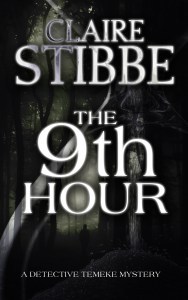 After completing The 9th Hour, finding a publisher was the hardest part. It required many hours of searching for good publishers with a good reputation and ones with open submissions. I was fortunate to have been accepted by Crooked Cat, a publisher based in Scotland. Many of their authors have been shortlisted for prestigious awards, amazing writers who have simply soured up the charts and currently enjoy bestseller status. I would say this is indeed a cattery of quality.
After completing The 9th Hour, finding a publisher was the hardest part. It required many hours of searching for good publishers with a good reputation and ones with open submissions. I was fortunate to have been accepted by Crooked Cat, a publisher based in Scotland. Many of their authors have been shortlisted for prestigious awards, amazing writers who have simply soured up the charts and currently enjoy bestseller status. I would say this is indeed a cattery of quality.
For me, the best part of writing is the process. Researching ideas for the first novel in the Detective Temeke series has been so much fun, especially driving around Albuquerque through all the areas Temeke and his partner, Malin would go. This book takes place in Cimarron State Park where a nine-year-old African American girl has been abducted. Temeke, a detective working for violent crimes against children is called out one early December morning to take over a case nobody wants. Why? Because former lead Detective Jack Reynolds was found dead under the bridge on Exit 230 to San Mateo. He had a gunshot wound to his head. With a new partner, a new case and a new set of wheels, Temeke takes to the roads in search of a man who keeps the body parts of his eight young victims as trophies and has a worrying obsession with the number nine.
With so many state parks here in New Mexico, the hiking trails are numerous and great places to learn about the history of the southwest. Big blue skies, palisade cliffs and all kinds of fauna only add to each scene. With the help of detectives in the local police department, this has been crucial in piecing together a serial killer’s steps. Winter’s coming . . .
The weather has been particularly stormy recently, slate-grey skies, a sheet of rain one minute and the growl of thunder the next, which has provided the right mood to give me inspiration. I’m loving the characters and the way they lead each chapter to who knows where. And yes, I do normally have a structure, only this time it all went out of the window.
It’s all David Temeke’s fault. His dry wit often goes for the jugular, rubbing the department up the wrong way. Unit Commander Hackett is clearly suspicious of Temeke, an African/British ex-pat, and has reluctantly assigned him a new east coast transfer, Malin Santiago. It’s a high profile case where her Hispanic/Norwegian roots are a valuable asset to the team. Can’t say why. You’ll just have to read the book. Only, Temeke believes that Santiago lacks the necessary experience for such a case which is adding a considerable strain to their professional relationship. Not to mention her physical attraction to him which is about as welcome as a skunk at a lawn party.
 So this afternoon as I was sitting in my favorite coffee shop, I was this close to writing Santiago a great scene that would change Temeke’s view of her; maybe give him something to chew over. But being despicable me, I decided to leave it as it is. Unrequited love in the Northwest Area Command is much too much fun to watch. And Malin isn’t all smiles and teeth. There’s a certain metal in her psyche that gets stronger with every book. She might have started out as a pit-dweller, but she’s sure making up for it now.
So this afternoon as I was sitting in my favorite coffee shop, I was this close to writing Santiago a great scene that would change Temeke’s view of her; maybe give him something to chew over. But being despicable me, I decided to leave it as it is. Unrequited love in the Northwest Area Command is much too much fun to watch. And Malin isn’t all smiles and teeth. There’s a certain metal in her psyche that gets stronger with every book. She might have started out as a pit-dweller, but she’s sure making up for it now.
Winter’s coming . . .
All this and more in The 9th Hour, released November 17, 2015 by Crooked Cat Publishing.
Claire once ran a newspaper for two local business in Albuquerque and has also written short stories for Breakwater Harbor Books, a publisher of anthologies. The collection won Best Anthology of 2014 in the Independent Book Awards hosted by eFestival of Words. She is currently working on the second and third books in the Detective Temeke series in which she explores how even in the darkness of criminal depravity the light of faith is never entirely extinguished.
To find out more about Claire’s books, visit her website at http://www.cmtstibbe.com .
For updates on new books, book signings and regular blog features, why not sign up for her occasional newsletter here
Follow on Facebook: https://www.facebook.com/ClaireStibbe
Blog: https://clairestibbe.wordpress.com/
Google: https://plus.google.com/+CMTStibbe/posts
Twitter: https://twitter.com/CMTStibbe
Claire is also a member of the New Mexico Book Co-op and the Southwest Writers Association.


October 31, 2015
Something for HALLOWEEN Weekend – with Jennifer C Wilson.
 Welcome to Jennifer C Wilson, who has just published her debut novel with Crooked Cat Publishing – Kindred Spirits: Tower of London. She’s someone who knows her history as well as her spirits – so have a read then head on over to Amazon to grab the book. That’s Halloween reading sorted! Take it away, Jennifer…
Welcome to Jennifer C Wilson, who has just published her debut novel with Crooked Cat Publishing – Kindred Spirits: Tower of London. She’s someone who knows her history as well as her spirits – so have a read then head on over to Amazon to grab the book. That’s Halloween reading sorted! Take it away, Jennifer…
I think most of us, despite what we believe, are a little bit obsessed by ghosts, be it the spirit of a beloved relative that we want to feel close to after they’ve left us, or that of a historical ‘celebrity’, one of the great movers or shakers of their day. Every one of them has their tale to tell: of love lost, a tragic end, or a miscarriage of justice. And this makes them incredibly interesting characters to set a story around.
I am largely a coward, but have always been intrigued by the tales which focus around our major historical sites and buildings. So many castles have their grey or blue ladies, often the poor young women of the household, forbidden to follow their hearts, or the focuses of their affections, cut down by angry fathers, brothers or would-be husbands. And if anywhere has more than its fair share of spirits hanging around, it has to be the Tower of London.
 Despite being at the heart of English, and subsequently British, history since the earliest days of the Conquest, the Tower had never truly captured my imagination, but at some point, several years ago now, Richard III cropped up in a book I was reading, and I became fascinated by him and his life. It occurred to me that he and Anne Boleyn would probably have enough in common for their ghosts to be friends, and that the most sensible place for those ghosts to ‘live’ was probably the Tower of London.
Despite being at the heart of English, and subsequently British, history since the earliest days of the Conquest, the Tower had never truly captured my imagination, but at some point, several years ago now, Richard III cropped up in a book I was reading, and I became fascinated by him and his life. It occurred to me that he and Anne Boleyn would probably have enough in common for their ghosts to be friends, and that the most sensible place for those ghosts to ‘live’ was probably the Tower of London.
After writing a truly awful poem for a competition, the idea kept nagging away at me, and eventually became my project for NaNoWriMo 2013. A lot has changed in the editing process, but the opening lines are still broadly the same…
“You’re late.”
“You’re dead.”
Anne sighed. “We’ve been through this before, Richard. It wasn’t funny then, and it isn’t funny now.”
“Well, it’s this lot. All these years, and I could swear they’re getting worse.” He leaned back against the cool brick, and shaded his eyes as he scanned a group of already-bored teenagers being herded by an increasingly frustrated tour guide.
“Perhaps we are simply getting jaded. Come on, I know you love your school trips.”
“Anne…”
“Come along!”
She gave him no choice, pulling him away from the wall. He sighed. Anne was right; he did enjoy independent tours like this one, although he would enjoy them so much more if they got their facts right. He watched her as she wandered around the back of the group, looking for targets.
“Shall we give them the full works?” she called over to him.
I loved reading so much material about the Tower, before finally getting to explore it for real. My main problem was being selective about which ghosts to pick – even now, I read a new book and find somebody else who could have been there!
Throughout the writing of the novel, I wanted to portray the camaraderie which I’d hope would exist, as well as the obvious conflicts which might arise between the ‘residents’ of the Tower. Mainly though, I wanted to capture a sense of fun, because I certainly had fun writing it, and hope people have fun reading it too.
Here’s the blurb to whet your appetite…
A King, three Queens, a handful of nobles and a host of former courtiers…
In the Tower of London, the dead outnumber the living, with the likes of Tudor Queens Anne Boleyn and Katherine Howard rubbing shoulders with one man who has made his way back from his place of death at Bosworth Field to discover the truth about the disappearance of his famous nephews.
Amidst the chaos of daily life, with political and personal tensions running high, Richard III takes control, as each ghostly resident looks for their own peace in the former palace – where privacy was always a limited luxury.
With so many characters haunting the Tower of London, will they all find the calm they crave? But foremost – will the young Plantagenet Princes join them?
Jennifer is a marine biologist by training, who developed an equal passion for history whilst stalking Mary, Queen of Scots of childhood holidays (she has since moved on to Richard III). She completed her BSc and MSc at the University of Hull, and has worked as a marine environmental consultant since graduating.
Enrolling on an adult edication workshop on her return to the north-east reignited Jennifer’s pastime of creative writing, and she has been filling notebooks ever since. In 2014, Jennifer won the Story Tyne short story competition, and also continues to work on developing her poetic voice, reading at a number of events, and with several pieces available online.
Jennifer blogs at https://jennifercwilsonwriter.wordpress.com/ and can be found on Twitter as @inkjunkie1984.


October 23, 2015
Something for the Weekend with… Olga Swan!
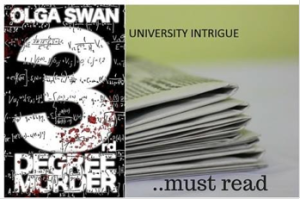 Thanks so much for welcoming me onto your esteemed blog! I’ve flown up specially from Gaillac, S.W. France to be with you, even though I’m also hosting my own Crooked Cat book launch event right at this minute too! Readers: I do hope that, once you’ve read Shani’s blog today, you’ll also pop over to my events party anytime today (23rd October 2015) from 10 a.m. to 6 p.m. EU time. Hint: there’ll be exclusive pics of me in my dancing ‘folies bergere’ days! Here’s the link to make it easy for you: https://www.facebook.com/events/909706395761162/
Thanks so much for welcoming me onto your esteemed blog! I’ve flown up specially from Gaillac, S.W. France to be with you, even though I’m also hosting my own Crooked Cat book launch event right at this minute too! Readers: I do hope that, once you’ve read Shani’s blog today, you’ll also pop over to my events party anytime today (23rd October 2015) from 10 a.m. to 6 p.m. EU time. Hint: there’ll be exclusive pics of me in my dancing ‘folies bergere’ days! Here’s the link to make it easy for you: https://www.facebook.com/events/909706395761162/
Someone once told me that writers should only write about that which they know. So, after working for thirty years at a leading English university, this was clearly good material for writing ‘3rd Degree Murder’.
I use the nom de plume of Olga Swan as a way of remembering my late brother: it’s an anagram of his name. Quiz: see if you can work out what it is. (Answer* at the end.) I have been writing for over forty years (!), in many genres. Two historical mss, covering the period 1912 – 1967, are currently being considered by Crooked Cat Publishing as we speak. I am also self-publishing a series of seven novels for children, in my own name (Gillian Green – http://www.amazon.co.uk/-/e/B013IDLQ4O,) , each set in one of the seven modern wonders of the world. Additionally there’s a self-published non-fiction book about two self-deprecating seniors who move to France. In fact, I was thrilled that my publishers bought this recently and are shortly to write a review on Amazon. To find out more, go to my facebook and amazon author pages. http://www.amazon.co.uk/-/e/B013IBD4PU
Here’s a description of my current Crooked Cat novel ‘3rd Degree Murder’, released today:
University intrigue. A prestigious Vice-Chancellor receives two formal complaints just before he is due to retire. The underlying theme throughout weaves a potent, cultural mix between Maliha, a Muslim student and Jenny, a Jewish secretary. How do they get on, especially working for the same hated professor? Maliha suffers a horrifying rape at university. How will she cope? And the Jewish secretary suffers constant anti-semitic comments. Embroiled in the intrigue are a family at war with modern society, disgruntled lecturers, a V-C with a suspect background and a crazy office cleaner. So, in the end, who actually killed Professor Axel Sloan? This is a tale of revenge and blackmail; indeed a dish best served cold.
Did you or a member of your family attend university? Have you ever wondered what happens behind the scenes along the hallowed corridors of English academia? All is not how it seems. To find out, here’s the link to buying 3rd Degree Murder, now available on Amazon all over the world.
It is also available on Smashwords in many different formats: https://www.smashwords.com/books/view/585154.
You can pre-order or download a sample.
For an exclusive extract from 3rd Degree Murder: go to www.olgaswan.blogspot.com (my weekly Sunday blog about everything French and lots more besides.)
In due course please leave a review. I’d love to hear your views.
* My dear late brother’s name: A. Olswang.


October 15, 2015
Something for the Weekend with Nancy Jardine!
 Hello Shani, it’s a delight to come and visit your blog. Thank you for inviting me to fly south to keep you company today!
Hello Shani, it’s a delight to come and visit your blog. Thank you for inviting me to fly south to keep you company today!
Have you got lots of weekend plans? Is your weekend looking like the art of fitting a quart into a pint pot regarding the hours available and the leisure pursuits that need to be squeezed in? Alternatively, are you whooping it up because you can see a neat little reading slot fitting into the schedule of your weekend activities?
I really do hope the last question is the one which ‘fits your bill’ and you’ll have some hideaway time this weekend to pack in some reading for pure pleasure.
When I’m feeling a tad stressed out, due to a heavy schedule of daily life chores— the dreaded ironing/ house & garden maintenance/ and dare I say it with a big fat smile, my grandchild-minding duties—or, if I have too many social events consecutively on the calendar, the introvert in me craves a quiet spot to escape into a gripping novel. At times like these, all I generally want is a quick and satisfying read: one that puts no huge demands on me but is wholly entertainment. If I have a couple of hours on the trot for immersing myself (and sometimes that really does include being in a luxurious frothy bath with my Samsung tablet snug and tight in a Ziploc bag, and a glass of something lovely on the bath edge), I want the plot to whizz me off to lovely locations and the characters to seize me with their trials and tribulations as a gripping adventure unfolds.
 If you’re looking for something similar in humorous escapism for this coming weekend’s short reading slot, then fast-paced contemporary romantic mystery Take Me Now would be perfect. Fly with dynamic Aela Cameron and her temporary boss, Nairn Malcolm, as they uncover a mystery saboteur who has turned Nairn from handsome highland hero into a temporarily damaged one that looks like the ogre of the castle. Join them on a whirl-wind, precarious escapade as Aela ferries Nairn around the world to keep his ‘Adrenalinn Adventures’ business healthily ticking over.
If you’re looking for something similar in humorous escapism for this coming weekend’s short reading slot, then fast-paced contemporary romantic mystery Take Me Now would be perfect. Fly with dynamic Aela Cameron and her temporary boss, Nairn Malcolm, as they uncover a mystery saboteur who has turned Nairn from handsome highland hero into a temporarily damaged one that looks like the ogre of the castle. Join them on a whirl-wind, precarious escapade as Aela ferries Nairn around the world to keep his ‘Adrenalinn Adventures’ business healthily ticking over.
 Laugh alongside Aela when she meets her prospective multiple-fractured loopy boss for the first time! Grip the edge of your seat when Aela’s expertise in handling a tiny floatplane over dangerous west coast of Scotland waters gets them out of hairy-scary situations. Have fun with them in Barcelona and Paris. Empathise with Aela in Oman when diplomacy is so hard to stomach. Feel their relief after the saboteur is eventually sussed out—though all I’ll say here is that the location where that happens is a fabulously warm and sunny one!
Laugh alongside Aela when she meets her prospective multiple-fractured loopy boss for the first time! Grip the edge of your seat when Aela’s expertise in handling a tiny floatplane over dangerous west coast of Scotland waters gets them out of hairy-scary situations. Have fun with them in Barcelona and Paris. Empathise with Aela in Oman when diplomacy is so hard to stomach. Feel their relief after the saboteur is eventually sussed out—though all I’ll say here is that the location where that happens is a fabulously warm and sunny one!
Does Aela also become a target of the nasty saboteur? I’m afraid I’m giving away no more spoilers…you’ll have to read to find that out!
Once again, Shani, thanks for the opportunity to share a little of Take Me Now. Wishing all of your readers a lovely weekend!
Amazon link for Take Me Now: http://getbook.at/hereismypage
Bio: Nancy Jardine writes historical romantic adventures (Celtic Fervour Series); contemporary mystery thrillers (Take Me Now, Monogamy Twist, Topaz Eyes-finalist for THE PEOPLE’S BOOK PRIZE 2014); & time-travel historical adventures for Teen/ YA readers (Rubidium Time Travel Series). She finds all historical eras are enticing to research about and ancestry research is a lovely time-suck. She regularly blogs; loves to have guests invade her blog; and FaceBooking is a habit she’s trying to keep within reasonable bounds. Grandchild-minding takes up a few (very long) days every week and any time left is for gardening, reading, writing and watching news on TV( if lucky). Oh, and catching the occasional historical T.V. programme, being a bit of a historical junkie.
http://nancyjardine.blogspot.co.uk http://nancyjardineauthor.com/ Twitter @nansjar Facebook: http://on.fb.me/XeQdkG and http://on.fb.me/1Kaeh5G (for The Rubidium time Travel Novels.) email: nan_jar@btinternet.com
Amazon Author page for books and to view book trailer videos: http://viewauthor.at/mybooksandnewspagehere
Most novels are available in print and ebook formats from Barnes and Noble; W. H. Smith.com; Waterstones.com; Smashwords; TESCO Blinkboxbooks; and various other ebook stores.


October 8, 2015
Something For the Weekend with Neither Here Nor There…
The second author to feature on Friday’s Something for the Weekend is Miriam Drori, who writes about what inspired her to write her novel, Neither Here Nor There, a huge seller on Amazon – being in limbo basically – set between London and Jerusalem. Take it away, Miriam…
Greetings from Limbo
I think there are three parts to making a change:
Make the decision to change
Make the change happen
Get used to the change
The first stage can be split-second or it can develop over years. The second can be gradual or quick depending on the nature of the change. The third is bound to take time. The bigger the change, the more time it will take.
I remember my dad talking about giving up smoking. He’d started smoking because it was expected of every young man when he reached maturity. In the army, in the second world war, he didn’t like living with rationing. So one day, he gave his last box of fags to a friend, who thought he’d taken leave of his senses, and never smoked again. My dad described his decision as sudden, but I expect it came at the end of a longer process of indecision. The change itself was sudden, but there must have been a long and painful process of getting used to the change.
In a way, we’re all in limbo. Our lives constantly go through little changes and so we’re constantly between states of some sort. I just made the decision to give Toastmasters a break for a while because I need to make room for other things in my life. I’ll miss seeing the other members and challenging myself to present planned and spontaneous speeches, although I won’t miss the embarrassment that causes. Now I’ll have to get used to a Toastmaster-free existence.
 Esty spends the whole of my novel, Neither Here nor There, in a state of limbo (hence the title). Her decision to leave the ultra-orthodox community in which she was brought up was one that germinated over several years. The change itself takes just a few hours. It is the third stage, the process of acclimatising to her new world, that keeps Esty occupied throughout the novel. From the difficulty of dropping beliefs and morals ingrained in her to the shock of meeting up with her previous life, Esty finds herself climbing a mountain she didn’t even know existed.
Esty spends the whole of my novel, Neither Here nor There, in a state of limbo (hence the title). Her decision to leave the ultra-orthodox community in which she was brought up was one that germinated over several years. The change itself takes just a few hours. It is the third stage, the process of acclimatising to her new world, that keeps Esty occupied throughout the novel. From the difficulty of dropping beliefs and morals ingrained in her to the shock of meeting up with her previous life, Esty finds herself climbing a mountain she didn’t even know existed.
Here’s an excerpt to give you an idea:
A woman opened the door for her. She was dressed in a skirt and a long-sleeved top, and Esty wondered if she’d dressed that way on purpose to appease her parents.
“I’m Esty.”
The woman indicated the room and opened the door for her. “Let yourselves out when you’ve finished.”
Esty managed to say, “Thank you,” before the woman closed the door leaving Esty alone in the room. She sat down on an armchair feeling confused. She was about to see her own parents. The parents she had always loved, respected and honoured. So why did she now feel as if some terrible ordeal awaited her? Then she thought of the poor Afghan girl in the film she’d seen with Mark. That girl’s parents had frightened her at the mere suggestion that she might not want to marry the man they had chosen for her. Later, there had been violence. Esty was shocked that such things could happen. She knew her father would never resort to violence against her, and yet her memories of the film made her more worried.
Esty had no idea what form this meeting would take, but she had tried to prepare for it by listing possible questions and her answers. She would tell them why she left so that they’d understand. She would describe the family she was living with, so that they could be assured that she was being well looked after. Then she might talk about her plans for the future. And of course she would ask after them and all her siblings.
It wasn’t long before the doorbell rang and the door to the room opened. Esty heard her mother’s voice saying, “Thank you,” and she stood up. Then her parents were in the room and her mother rushed to hug her. “Esty, darling.”
Esty hugged her mother back. So they weren’t angry. It was going to be all right after all. Then she looked up at her father and instantly changed her mind. She’d never seen him looking so stern, so angry.
 Neither Here Nor There
Neither Here Nor ThereSo much more than a romance, this is a tale of transformation in an exotic setting. Esty’s life was laid out for her from birth. She would marry one of a handful of young men suggested to her and settle down to raise a large family in a tiny space within the closed community of her parents, near to and yet far from the modern world. But Esty has decided to risk all by escaping while she still can. Will she make it to the other side? Mark, who is struggling with his own life changes, hopes that Esty will find a way through her troubles. He is fast falling in love with her. Separately and together, in Jerusalem and London, Esty and Mark need to overcome many obstacles in their endeavour to achieve their dream.
Neither Here Nor There is available from Amazon, Smashwords and elsewhere.
 Miriam Drori
Miriam DroriMiriam Drori was born and brought up in London and now lives with her husband and two of her grown up children in Jerusalem.
With a degree in Maths and following careers in computer programming and technical writing, Miriam has been writing novels and short stories for eleven years. Two of her short stories have been published in anthologies and others have been published online. Neither Here Nor There is her first novel.
Miriam began writing in order to help raise awareness of social anxiety. Since then, the scope of her writing has widened, but she hasn’t lost sight of her original goal.



